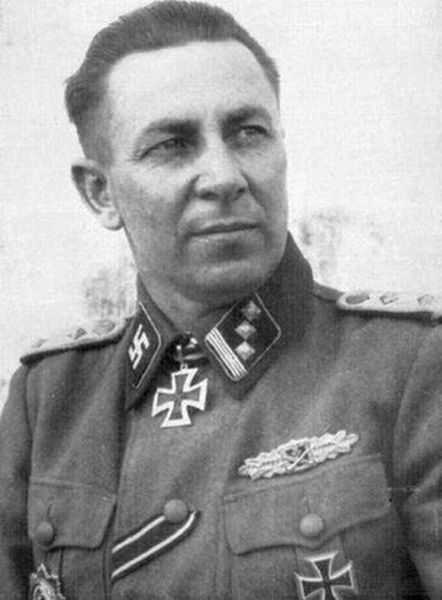Butkus, Zanis (Waffen SS)
- Date of birth:
- July 29th, 1906 (Augstkalne, Lettland)
- Date of death:
- May 15th, 1999 (Palmer/Alaska, United States)
- Service number:
- SS-Nr.: // NSDAP-Nr.:
- Nationality:
- Latvian (1941-1945, Reichskommissariat Osland)
Biography
By September 1944, Zanis Butkus had achived a total of 59 'nahkampftage', but up till this date there has been found no confirmation this had lead to the awarding of the Nahkampfspange in Gold.
00.00.1927-00.00.1929: joined the Latvian Army
00.00.1941: wife and daughter deported to Siberia by the Soviet authorities - joined the partisans to fight against the Soviet forces
00.08.1943: led an assault team into the Soviet lines and proceeded to capture a string of bunkers, without suffering a single casualty. His force soon returned to the German lines with numerous prisoners and a substantial amount of equipment - Volchov Front
Do you have more information about this person? Inform us!
- Period:
- Second World War (1939-1945)
- Period:
- Second World War (1939-1945)
- Period:
- Second World War (1939-1945)
- Awarded on:
- 1942
- Period:
- Second World War (1939-1945)
- Period:
- Second World War (1939-1945)
- Rank:
- SS-Untersturmführer (2nd Lieutenant)
- Unit:
- 10. Kompanie, SS-Freiwilligen-Grenadier-Regiment 43, 2. Lettische SS-Freiwilligen-Brigade
- Awarded on:
- June 28th, 1944
- Period:
- Second World War (1939-1945)
- Awarded on:
- July 1944
- Period:
- Second World War (1939-1945)
- Rank:
- SS-Hauptsturmführer (Captain)
- Unit:
- Führer, 10. Kompanie, SS-Feldersatz-Bataillon 19, 19. SS-Waffen-Grenadier-Division
- Awarded on:
- September 21st, 1944
“On the 08.08.1944 Waffen-Untersturmführer Butkus, along with the other elements of the Feldersatz-Bataillon 19 and the Kampfgruppe Bataillon of the SS-Gren.Rgt. 43 (lett.Nr.2), were thrown into action behind the right wing of the 19. Waffen-Gren.Div. der SS (lett.Nr.2), which was at the time fighting within the Aiviekste Line. They were sent into battle against a strong enemy force that had managed to achieve a deep penetration. The objective was to prevent this deep penetration from turning into a breakthrough.
Butkus’s mission was to use his ~50 man strong Kompanie to secure an approximately 3 km wide forest edge against the strong enemy infantry forces coming against it. This location was in the vicinity of Dalgi, northeast of Modon.
Right from the start Butkus was forced to attack and capture the position he had been ordered to occupy. After seizing this position he had to defend it for almost 20 hours against uninterrupted enemy attacks. Such a task was only made possible through scouting out the location of approaching enemy forces with patrols and then energetically attacking them with his small Kompanie. In the process of doing this he personally penetrated into enemy jump-off positions on two occasions. Throughout this combat he destroyed at least 2 Russian companies and captured 4 anti-tank guns as well as 2 heavy infantry guns.
After a 20 hour battle the elements of the Feldersatz Bataillon and Kampfgruppe Bataillon 43 on either side of him had been pushed back by the superior enemy attacks. However even then Butkus held onto his position with only a few men for a further 6 hours, and by doing so he enabled the remaining friendly units to occupy new positions further to the rear. In the process Butkus and his men were encircled by the enemy, and Butkus was forced to break through to his unit with the last men of his Kompanie. By this time he had received mortar splinter wounds to both his shoulder and leg, as well as a particularly severe shell splinter wound to his right abdominal side. However he did not let this stop him, and he held his few men together in a last-stand fight. He ultimately reached the rearward position of his Bataillon with only 8 men.
The outstanding bravery demonstrated here by Butkus brought about a decisive result for the entire sector. Without his successful stand it would probably have been impossible for the Division to both occupy its later position in such an orderly fashion and thereafter offer up renewed resistance against a hotly pursuing enemy. The last hours of his stand are particularly praiseworthy as the severity of his injures would most certainly have resulted in him being evacuated to the hospital under normal circumstances. According to the doctors his life was seriously endangered by the fact that he endured his abdominal wound for several hours without medical help, a matter made even worse by his walking for a few more hours with it.
The enclosed combat map provides evidence as to the significance of Butkus’s actions.
Butkus is one of a handful of Latvian officers who, through his consistent energy and bravery, ranks among the top officers of the Division. Over the course of uncounted small-unit operations he has repeatedly proven himself to be a man of exceptional bravery and ruthlessness. The Wound Badge in Gold and German Cross in Gold further testify to his persistent bravery. Furthermore he is also due to be awarded the Close Combat Clasp in Gold.”
- Period:
- Second World War (1939-1945)
Sources
- Photo 1: S. Wieslaw
- - FELLGIEBEL, W.P., Elite of theThird Reich, Helion & Company Limited, Solihull, 2003.
- PATZWALL, K. & SCHERZER, V., Das Deutsche Kreuz 1941-1945, Verlag Klaus D. Patzwall, Norderstedt, 2001.
- Die Ordensträger der Deutschen Wehrmacht (CD), VMD-Verlag GmbH, Osnabrück, 2002
- Microfilm Publication A3343. US National Archives.










